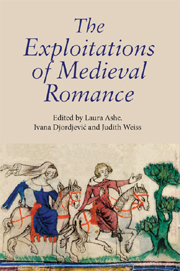Book contents
- Frontmatter
- Contents
- Preface
- Notes on Contributors
- Abbreviations and Editorial Note
- Introduction
- 1 The Fairies in the Fountain: Promiscuous Liaisons
- 2 Saracens and Other Saxons: Using, Misusing, and Confusing Names in Gui de Warewic and Guy of Warwick
- 3 The Exploitation of Ideas of Pilgrimage and Sainthood in Gui de Warewic
- 4 Chanson de geste as Romance in England
- 5 Patterns of Availability and Demand in Middle English Translations de romanz
- 6 Reading a Christian–Saracen Debate in Fifteenth-Century Middle English Charlemagne Romance: The Case of Turpines Story
- 7 Subtle Crafts: Magic and Exploitation in Medieval English Romance
- 8 Meeting Grounds: Gardens in Middle English Romance
- 9 ‘Als for the worthynes of þe romance’: Exploitation of Genre in the Buik of Kyng Alexander the Conquerour
- 10 Sir Gawain and the Green Knight and the Limits of Chivalry
- Index of Manuscripts
- General Index
1 - The Fairies in the Fountain: Promiscuous Liaisons
Published online by Cambridge University Press: 12 September 2012
- Frontmatter
- Contents
- Preface
- Notes on Contributors
- Abbreviations and Editorial Note
- Introduction
- 1 The Fairies in the Fountain: Promiscuous Liaisons
- 2 Saracens and Other Saxons: Using, Misusing, and Confusing Names in Gui de Warewic and Guy of Warwick
- 3 The Exploitation of Ideas of Pilgrimage and Sainthood in Gui de Warewic
- 4 Chanson de geste as Romance in England
- 5 Patterns of Availability and Demand in Middle English Translations de romanz
- 6 Reading a Christian–Saracen Debate in Fifteenth-Century Middle English Charlemagne Romance: The Case of Turpines Story
- 7 Subtle Crafts: Magic and Exploitation in Medieval English Romance
- 8 Meeting Grounds: Gardens in Middle English Romance
- 9 ‘Als for the worthynes of þe romance’: Exploitation of Genre in the Buik of Kyng Alexander the Conquerour
- 10 Sir Gawain and the Green Knight and the Limits of Chivalry
- Index of Manuscripts
- General Index
Summary
A valiant and handsome knight spends all his money attempting to support himself at court. One day, he goes for a ride in the countryside and eventually comes to a meadow where there is a flowing stream or spring. Here he encounters three beautiful, but apparently otherworldly, women. What happens next involves a certain amount of gratuitous female nudity and results in the knight being granted certain magical privileges. These provide him with abundant access to both money and sexual gratification. After returning to civilization, he enjoys these gifts untroubled for a while, but then finds himself in a situation where he is challenged by the presiding lady of the court to prove the reality of his magical good fortune. This he initially finds difficult to do, but he is eventually vindicated; and the lady is shown to have attempted to stifle the truth about her own sexual behaviour.
This account might serve as a very rudimentary summary of Marie de France's lai Lanval, or else of the anonymous Lai de Graelent – but not just of these two Old French lais. It is also an accurate description, so far as it goes, of a text that is known as Le Chevalier qui fist les cons parler (literally, ‘The Knight Who Made the Cunts Speak’, or, as Carter Revard has wittily suggested, ‘The Vagina Dialogues’). It is a fabliau that survives in seven medieval manuscripts, including an English one (London, BL, Harley MS 2253).
- Type
- Chapter
- Information
- The Exploitations of Medieval Romance , pp. 15 - 27Publisher: Boydell & BrewerPrint publication year: 2010



